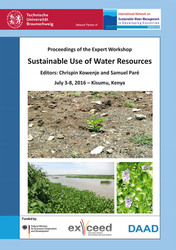| Fachbereiche | |
|---|---|
| Buchreihen (96) |
1381
|
| Nachhaltigkeit |
3
|
| Gesundheitswesen |
1
|
| Geisteswissenschaften |
2369
|
| Naturwissenschaften |
5408
|
| Mathematik | 229 |
| Informatik | 319 |
| Physik | 980 |
| Chemie | 1364 |
| Geowissenschaften | 131 |
| Humanmedizin | 243 |
| Zahn-, Mund- und Kieferheilkunde | 10 |
| Veterinärmedizin | 108 |
| Pharmazie | 147 |
| Biologie | 835 |
| Biochemie, Molekularbiologie, Gentechnologie | 121 |
| Biophysik | 25 |
| Ernährungs- und Haushaltswissenschaften | 45 |
| Land- und Agrarwissenschaften | 1005 |
| Forstwissenschaften | 201 |
| Gartenbauwissenschaft | 20 |
| Umweltforschung, Ökologie und Landespflege | 148 |
| Ingenieurwissenschaften |
1795
|
| Allgemein |
98
|
|
Leitlinien Unfallchirurgie
5. Auflage bestellen |
|
Erweiterte Suche
Sustainable Use of Water Resources
Proceedings of the Expert Workshop, July 3-8, 2016 – Kisumu, Kenya
Müfit Bahadir (Herausgeber)Vorschau
Inhaltsverzeichnis, PDF (100 KB)
Leseprobe, PDF (140 KB)
According to the Sustainable Development Goals (SDGs), water is the limiting agent in sustainable development and is critical to all socio-economic aspects of human welfare, including security, energy, food, and health issues. It is essential for the production and preservation of foodstuff, is a host of benefits and services for people, and plays a key role in strengthening the resilience of social, economic, and environmental systems in the light of rapid and unpredictable changes. However, water can also pose serious challenges to sustainable development if not managed efficiently and equitably.
In the past, many water related workshops and conferences have been held all over the world, however, the here reported one is the first expert workshop integrating social-economic and engineering scientists, practitioners, and policy makers in in the field of sustainable water management in Sub-Saharan Africa region. In addition, the subject of the workshop “Sustainable Use of Water Resources” addresses the challenges outlined in the Kenyan Vision 2030 programs. Additionally, Africa’s rising population is the driving force of the demand for water and accelerates the degradation of water resources in many countries on the continent. Current research has projected that almost all African countries will face either absolute or economic water scarcity by 2025.
The main objective of the workshop was to share experiences, knowledge, and research outcomes among experts of water and environment, and to discuss major problems and challenges in the field of sustainable water management in Sub-Saharan Africa Region. It also aimed (i) to improve the understandings of the interrelationship between SDGs and the Integrated Water Resources Management (IWRM); to identify the current trends in water management practices and their shortcomings; (iii) to establish a Sub-Saharan Africa Network of water experts; and (iv) to identify promising areas of future research for the Sub-Saharan Africa Region.
| ISBN-13 (Printausgabe) | 9783736994539 |
| ISBN-13 (E-Book) | 9783736984530 |
| Buchendformat | B5 |
| Sprache | Englisch |
| Seitenanzahl | 136 |
| Auflage | 1. Aufl. |
| Erscheinungsort | Göttingen |
| Erscheinungsdatum | 27.01.2017 |
| Allgemeine Einordnung | Proceeding |
| Fachbereiche |
Land- und Agrarwissenschaften
|
| Schlagwörter | Sustainable Development, water, human welfare, security, energy, food, health issues, water scarcity, environment, Sub-Saharan Africa region, water management |
| URL zu externer Homepage | http://www.exceed-swindon.org/ |








